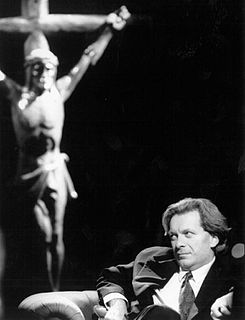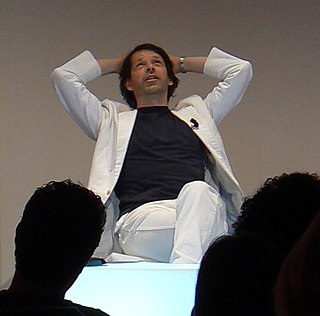
Joy Division were an English rock band formed in Salford in 1976. The group consisted of vocalist Ian Curtis, guitarist/keyboardist Bernard Sumner, bassist Peter Hook and drummer Stephen Morris.

New Order are an English rock band formed in 1980 by vocalist and guitarist Bernard Sumner, bassist Peter Hook and drummer Stephen Morris. The band formed after the demise of Joy Division, following the suicide of lead singer Ian Curtis. They were joined by Gillian Gilbert on keyboards later that year. New Order's integration of post-punk with electronic and dance music made them one of the most acclaimed and influential bands of the 1980s. They were the flagship band for Manchester-based independent record label Factory Records and its nightclub The Haçienda, and they worked in long-term collaboration with graphic designer Peter Saville.

Ian Kevin Curtis was an English singer-songwriter and musician. He was the lead singer and lyricist of the post-punk band Joy Division and recorded two albums with the group: Unknown Pleasures (1979) and Closer (1980). Curtis was known for his bass-baritone voice, dance style and songwriting typically filled with imagery of desolation, emptiness, and alienation.

Factory Records was a Manchester-based British independent record label founded in 1978 by Tony Wilson and Alan Erasmus.

James Martin Hannett, initially credited as Martin Zero, was an English record producer, musician and an original partner/director at Tony Wilson's Factory Records. Hannett produced music by artists including Joy Division, the Durutti Column, Magazine, John Cooper Clarke, New Order, Orchestral Manoeuvres in the Dark and Happy Mondays. His distinctive production style used unorthodox sound recording and technology and has been described as sparse, spatial, and cavernous.

The Haçienda was a nightclub and music venue in Manchester, North West England, which became famous during the Madchester years of the 1980s and early 1990s.

Peter Hook is an English musician, best known as the bassist and co-founder of the rock bands Joy Division and New Order. Hook often used the bass as a lead instrument, playing melodies on the high strings with a signature heavy chorus effect. In New Order, he would do this, leaving the actual basslines to keyboards or sequencers.

Anthony Howard Wilson was a British record label owner, radio and television presenter, nightclub manager, impresario and a journalist for Granada Television and the BBC.

24 Hour Party People is a 2002 British biographical comedy-drama film about Manchester's popular music community from 1976 to 1992, and specifically about Factory Records. It was written by Frank Cottrell Boyce and directed by Michael Winterbottom. The film was entered into the 2002 Cannes Film Festival to positive reviews.
A Certain Ratio are an English post-punk band formed in 1977 in Flixton, Greater Manchester by Peter Terrell and Simon Topping, with additional members Jez Kerr, Martin Moscrop, Donald Johnson (drums), and Martha Tilson (vocals) joining soon after.

Unknown Pleasures is the debut studio album by English rock band Joy Division, released on 15 June 1979 by Factory Records. The album was recorded and mixed over three successive weekends at Stockport's Strawberry Studios in April 1979, and was produced by Martin Hannett, who incorporated a number of unconventional production techniques into the group's sound. The cover artwork was designed by artist Peter Saville, using a data plot of signals from a radio pulsar. It is the only Joy Division album released during lead singer Ian Curtis's lifetime.

Slaughter and the Dogs are an English punk rock band formed in 1975 in Wythenshawe, Manchester. Their original line-up consisted of singer Wayne Barrett McGrath, rhythm guitar Mick Rossi, drummer Brian "Mad Muffet" Grantham, lead guitarist Mike Day and bassist Howard "Zip" Bates.

Peter Andrew Saville is an English art director and graphic designer. He came to prominence for the many record sleeves he designed for Factory Records, which he co-founded in 1978 alongside Tony Wilson and Alan Erasmus.
Manchester's music scene produced successful bands in the 1960s including the Hollies, the Bee Gees and Herman's Hermits. After the punk rock era, Manchester produced popular bands including Joy Division, New Order, The Smiths and Simply Red. In the late 1980s, the ecstasy-fuelled dance club scene played a part in the rise of Madchester with bands like the Stone Roses, Inspiral Carpets and Happy Mondays. In the 1990s, Manchester saw the rise of Britpop bands, notably Oasis.
52nd Street were a British jazz-funk and R&B band formed in Manchester in late 1980. Throughout the 1980s the group enjoyed success not only in the UK but also on the Billboard chart in the United States. Their biggest and best-known hit single was "Tell Me ", released in 1985 by the 10 Records subsidiary of Virgin Records in the UK, and then months later on in 1986 on MCA Records in the US.
Alan Erasmus is a British actor best known for his involvement in the Manchester music scene starting in the 1970s. He co-founded Factory Records with Tony Wilson, which signed Joy Division and Happy Mondays. He also co-founded The Haçienda with Wilson, Rob Gretton and New Order, a famous Manchester nightclub which closed down in the summer of 1997. As an actor, Erasmus appeared in several roles in the 1970s including ITV Playhouse and Play for Today, wherein he played minor roles.
Rob's Records was a British, Manchester-based independent record label founded by Rob Gretton, former manager of Joy Division and New Order, and a co-director of Factory Records.

Control is a 2007 British biographical film about the life of Ian Curtis, singer of the late-1970s English post-punk band Joy Division. It is the first feature film directed by Anton Corbijn, who had worked with Joy Division as a photographer. The screenplay by Matt Greenhalgh was based on the biography Touching from a Distance by Curtis's widow Deborah, who served as a co-producer on the film. Tony Wilson, who released Joy Division's records through his Factory Records label, also served as a co-producer. Curtis' bandmates Bernard Sumner, Peter Hook, and Stephen Morris provided incidental music for the soundtrack via their post-Joy Division incarnation New Order. Control was filmed partly on location in Nottingham, Manchester, and Macclesfield, including areas where Curtis lived, and was shot in colour and then printed to black-and-white. Its title comes from the Joy Division song "She's Lost Control", and that much of the plot deals with the notion that Curtis tried to remain in control of his own life, and yet had no control over his epilepsy and pharmaceutical side effects.

Rafters, later known as Jilly's, was a nightclub located in St. James Buildings, Oxford Street, Manchester, England. Some well-known bands played concerts at Rafters in the 1970s and 1980s.
New Hormones was a Manchester independent record label founded by Buzzcocks and manager Richard Boon. It was the first independent punk rock label in the UK.














